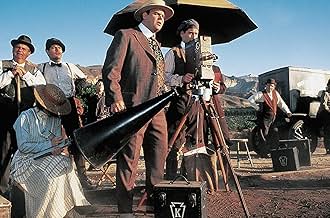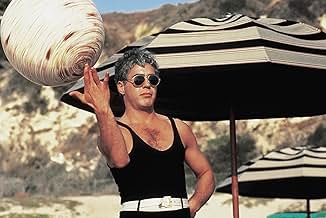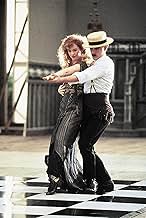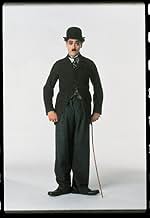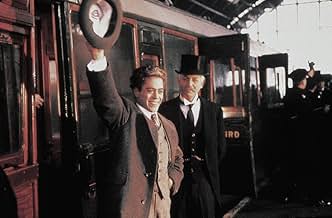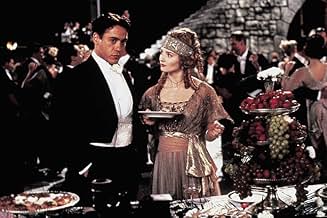अपनी भाषा में प्लॉट जोड़ेंAn elderly Charlie Chaplin discusses his autobiography with his editor, recounting his amazing journey from his poverty-stricken childhood to world-wide success after the ingenious invention... सभी पढ़ेंAn elderly Charlie Chaplin discusses his autobiography with his editor, recounting his amazing journey from his poverty-stricken childhood to world-wide success after the ingenious invention of the Little Tramp.An elderly Charlie Chaplin discusses his autobiography with his editor, recounting his amazing journey from his poverty-stricken childhood to world-wide success after the ingenious invention of the Little Tramp.
- 3 ऑस्कर के लिए नामांकित
- 3 जीत और कुल 20 नामांकन
- Lita Grey
- (as Deborah Maria Moore)
फ़ीचर्ड समीक्षाएं
The film begins by exploring the early life of Charlie, his Brother Sid and his Mother as they try to scrape a living. Thankfully Attenborough doesn't concentrate too much on this deprived part of Chaplin's life. However it does reveal interesting facts about Charlie that he never forgot during his rise to superstardom.
Although Chaplin is played by younger actors at the begining it is the arrival of Robert Downey Jnr which Chaplin fans will anticipate the most. He puts in an amazing performance, his London accent is excellent and ability to do slapstick even better he also really makes you believe that the great man is alive and on the screen again.
The film rightly concentrates on the private life of Chaplin and the development of the cinema. Whilst others may want to see the film concentrate on Chaplin's great pictures e.g The Kid, Gold Rush, and the Great dictator Attenborough blends the creation of these films into specific turning points in Charlie's life. For example Modern times is used to show Chaplin's sympathy towards victims of the wall street crash, as he knew what it was like to be extremely poor. His Jewish connections are also highlighted by the Great dictator, which shows his sensitivities to the European Jews were more at heart than just a making a heap of cash by having a laugh at Hitler's moustache and goose stepping troops.
The film doesn't get bogged down by Chaplin's hectic love life, as Dickie explores Charlie's political beliefs and how J Edgar Hoover was convinced of he was a communist party member. By doing so it shows how Hoover was one of the most twisted individuals to hold public office, with a dangerous obsession on peoples private lives and background.
The film does a good job in showing how important silent stars were and how we should not forget that they were the true greats when films were developing all the time from shorts to feature length, from silent to sound.
We also see Fred Karno, robustly played by John Thaw, and Hetty , played by Moira Kelly(who did struggle with the accent). A standout from the supporting cast, was a lively performance from Kevin Kline, who brought some great energy into the role of Douglas Fairbanks. The performances in general are very good indeed, and the film looks ravishing with show stopping costumes and scenery.
However, it is after the death of Fairbanks, that the film starts to drag, and the title characters rapidly turn into a series of vignettes. As much a great actor Anthony Hopkins is, his turn as the fictional autobiographer was perhaps unnecessary. And I was a bit confused why they turned Hoover as a villain who wanted Chaplin out of the country. The ending is poignant, and Moira Kelly does better in her role as Oona.
The end credits were very educational, and the arrangement of Smile was one of my highlights of this beautifully made but ambitious film. Worth watching for those who are a fan of Richard Attenborough (the director) 8/10 Bethany cox
Now as a fan of Chaplin's films and the given acknowledgment that he's one of the most talented comic actors and filmmakers of the 20th century, I do get a little choked up seeing that final clip-show at the Oscars of great clips from his most famous movies. And it's interesting always, from just a movie-buff stand-point, to watch the history behind Chaplin's transition from vaudeville to Max Senett's film company to slowly becoming an independent and world-famous auteur/star. But for the most part the writing and the direction make it entertaining just on that conventional, rise-fall-rise-fall-struggle-success-at-end story with maybe less drugs and a bit more politics than one might usually see (save for one fantastic scene when Chaplin and his brother and friends are sneaking around the film footage of The Kid from the brass who want it for tax purposes).
What makes it almost outstanding, however, is Downey Jr. He's funny as Chaplin when he needs to show how he was a great clown (i.e. the 'old-drunk' bit), he's melancholy when needed, he plays Chaplin as young, middle-aged, and old perfectly, and there's just the slightest details that keep you glued to the screen to see what he'll do next. It's not exactly a breakthrough role as he'd been doing some really good work intermittently in the late 80s, but this is the one that got him recognition by the likes of the Academy, and rightfully so. It's masterful work in a decent tribute to Sir Charles "Tramp" Chaplin, and should delight those looking for a good ensemble and a commanding lead performance.
The direction is very good; I particularly liked how some of the straight scenes were filmed in a comic, surrealist style (Chaplin's escape from the police w/ his cans of "the Kid" reels is staged like a Keystone Komedy), while some of what might have been more comic elements are played straight (Chaplin's attempt to convince his brother that "The Tramp" cannot talk in a movie is both funny and serious, for example). Some of the (perhaps true to life) melodramatic elements are a bit overplayed (the bit with his mom was handled too heavily for my tastes, especially her shouting his name as she's dragged away by the asylum guards), but generally the film avoids genre cliches and "easy" scenes.
Great photography.
Downey Jr. fits the roll well, even rising to many of the physical challenges of the Chaplin mystique.
A superior film of its type, laced with self-conscious humor and self-reflection on the artistic temperament.
क्या आपको पता है
- ट्रिवियाGeraldine Chaplin played her real-life paternal grandmother Hannah Chaplin.
- गूफ़When Charlie is shown at the 1972 Oscars near the end of the movie, he is showed being brought to the podium in the wheelchair and then standing at the podium as the movie clips played. In the actual awards ceremony, Charlie walked out to the podium under his own power after the clips ended.
- भाव
German Diplomat: [offering his hand] Mr. Chaplin! I am a great admirer of yours.
Charlie Chaplin: I'm sorry, I prefer not to shake hands with Nazis.
German Diplomat: [laughs nervously] What have you got against us, Mr. Chaplin, hm?
Charlie Chaplin: What have you got against everybody else?
- क्रेज़ी क्रेडिटThe film ends with the final scene of The Circus (1928): Charlie Chaplin walks off into the distance.
- इसके अलावा अन्य वर्जनTo receive a 12 certificate the original UK cinema version was cut to remove one use of 'fucking' (during Charlie's homecoming visit to a pub). Later releases were uncut and upgraded to a 15 rating.
- कनेक्शनFeatured in Friday Night: एपिसोड #1.11 (1992)
- साउंडट्रैकThe Honeysuckle and The Bee
Written by Albert Fitz and William H. Penn (as William Penn)
टॉप पसंद
- How long is Chaplin?Alexa द्वारा संचालित
विवरण
- रिलीज़ की तारीख़
- कंट्री ऑफ़ ओरिजिन
- आधिकारिक साइटें
- भाषाएं
- इस रूप में भी जाना जाता है
- चैपलिन
- फ़िल्माने की जगहें
- उत्पादन कंपनियां
- IMDbPro पर और कंपनी क्रेडिट देखें
बॉक्स ऑफ़िस
- बजट
- $3,10,00,000(अनुमानित)
- US और कनाडा में सकल
- $94,93,259
- US और कनाडा में पहले सप्ताह में कुल कमाई
- $84,669
- 27 दिस॰ 1992
- दुनिया भर में सकल
- $94,93,259
- चलने की अवधि
- 2 घं 23 मि(143 min)
- रंग
- पक्ष अनुपात
- 1.85 : 1



